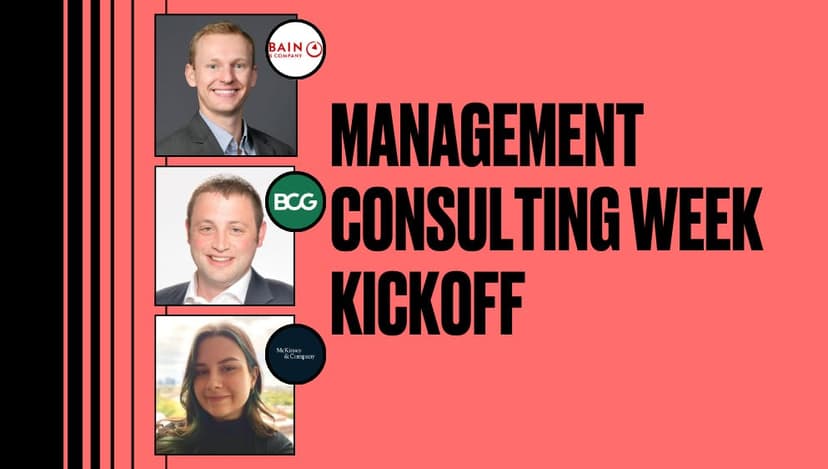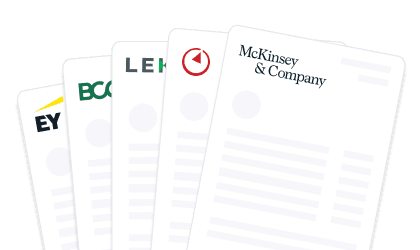Must-Have Consulting Skills for MBB: What Firms Look For
Discover the essential skills needed to succeed as a management consultant in this comprehensive guide.
Posted July 3, 2025

Join a free event
Learn from top coaches and industry experts in live, interactive sessions you can join for free.
Table of Contents
Management consulting is a dynamic and highly sought-after field, attracting professionals with diverse talents and a passion for solving complex business challenges. Whether you’re considering a career at top consulting firms or looking to enhance your capabilities in consulting roles, the foundation of success lies in mastering a set of very important skills.
In this article, we’ll explore the specific skills and qualities that distinguish successful management consultants, including problem-solving skills, analytical thinking, and the ability to collaborate effectively with clients and stakeholders. These consulting skills not only enable professionals to tackle complex problems but also help them thrive in the fast-paced environment of consulting firms.
Core Consulting Skills
To succeed in consulting, you need a strong mix of skills that help you work with clients, understand their needs, and provide smart solutions. Let’s break down the most important consulting skills that every professional should have:
Skill #1. Problem-Solving Skills
At the heart of consulting is the ability to solve problems. Whether it’s improving a company’s strategy or fixing inefficiencies, consultants are expected to find practical and effective solutions to complex problems.
- Why it’s important: Clients hire consultants to tackle challenges they can’t handle alone.
- How to build this skill: Practice analyzing problems step-by-step and coming up with clear plans to solve them.
Skill #2. Analytical Skills
Strong analytical skills help you break down data, find patterns, and turn numbers into meaningful insights. This is especially important in consulting roles where data analysis drives decision-making.
- Why it’s important: Management consultants use data to back up their recommendations.
- How to build this skill: Learn tools like Excel or Tableau, and practice interpreting numbers to tell a story.
Skill #3. Communication Skills
Being able to explain ideas clearly is critical in consulting. You’ll need to share your insights with clients, teammates, and other stakeholders in a way that’s easy to understand.
- Why it’s important: Clear communication helps build trust and ensures everyone is on the same page.
- How to build this skill: Practice presenting ideas simply and adapting your tone for different audiences.
Read: How to Get Into Consulting in 2025
Skill #4. Teamwork and Collaboration
Consultants rarely work alone. Most projects involve working with a team to deliver the best results. Knowing how to collaborate effectively is a must.
- Why it’s important: Great teamwork leads to better outcomes for the firm and its clients.
- How to build this skill: Work on group projects, listen to others, and focus on shared goals.
Skill #5. Adaptability
The consulting world changes quickly. Each project is different, and you’ll often have to adjust to new industries, challenges, or teams.
- Why it’s important: The ability to stay flexible ensures you can handle any situation.
- How to build this skill: Try new experiences, take on challenges outside your comfort zone, and learn from them.
Organizational and Operational Skills
Being a successful consultant isn’t just about solving problems – it’s also about staying organized and managing your work efficiently. Here are some key skills in this area:
Skill # 6: Project Management
As a consultant, you’ll often handle multiple tasks and projects at the same time. Managing everything properly is crucial to delivering high-quality work on time.
- What it means: Keeping track of deadlines, tasks, and responsibilities to make sure projects run smoothly.
- Tools and methods: Tools like Gantt charts and Agile methodologies can help you organize and plan projects efficiently.
- Why it matters: Delivering work within scope, on time, and on budget builds trust with clients and makes you a reliable team member.
Skill #7. Time Management
Time is always limited in consulting, and knowing how to use it wisely is a must.
- What it means: Prioritizing tasks, setting deadlines, and avoiding distractions to meet tight schedules.
- Tips to improve: Start each day by identifying your most important tasks, and focus on completing them first. Learn to say no to non-essential activities.
- Why it matters: Effective time management ensures that you stay productive and meet clients' expectations.
Skill #8. Adaptability and Flexibility
In consulting, every project is different. You’ll need to adjust quickly to new industries, clients, and unexpected changes.
- What it means: Being open to learning new things and changing your approach when needed.
- Real-world examples: Working on a healthcare project one month and switching to a tech project the next. Adjusting plans when unexpected challenges arise.
- Why it matters: The ability to stay flexible makes you a valuable team player who can handle any situation.
Leadership and Teamwork Skills
Being a consultant is not a solo job, but it also requires working with people at every level. Whether it’s your team, clients, or other stakeholders, strong leadership and teamwork skills are essential for long-term success.
Skill #9. Leadership Development
Leadership isn’t just for managers; even entry-level consultants need to show they can take charge when needed.
- What it means: Taking ownership of tasks, projects, or client relationships, and guiding others toward success.
- Leading by influence: In consulting roles, you often lead without direct authority. This means building trust and inspiring others to follow your recommendations.
- Why it matters: Strong leadership sets you apart as someone who can deliver results and take on more responsibility in your career.
Skill #10. Emotional Intelligence (EQ)
Being smart isn’t enough in consulting; you also need to connect with people emotionally. Emotional intelligence (EQ) helps you build relationships and handle tough situations.
- What it means: Understanding and managing your own emotions while being empathetic toward others.
- Building trust: Use empathy and self-awareness to build strong relationships with clients and colleagues.
- Managing conflicts: Handle disagreements or sensitive interactions with care and professionalism.
- Why it matters: High EQ helps you navigate the human side of consulting, ensuring smoother teamwork and stronger client trust.
Read: Management Consulting Firms: An Overview of the Top Players
Industry and Business Knowledge
To be a successful consultant, you need a solid understanding of the industries and businesses you work with. This knowledge helps you provide tailored and credible advice to clients.
Skill #11. Industry Expertise
Knowing the ins and outs of a client’s industry is key to offering relevant and impactful solutions.
- Why it matters: Clients trust consultants who show a deep understanding of their industry. It adds credibility and ensures your advice fits the specific needs of their business.
- How to build this skill: Quickly dive into industry trends, read reports, and talk to experts to stay informed. Pay attention to the challenges and opportunities unique to each sector.
Skill #12. Business Acumen
In addition to industry knowledge, understanding how businesses work on a practical level is just as important.
- What it means: Knowing financial metrics, business operations, and market dynamics to create actionable plans.
- Connecting strategy to execution: A strong consultant doesn’t just offer ideas but ensures those ideas can be put into practice effectively.
- How to improve: Study financial statements, research market trends, and learn about key performance indicators (KPIs) that drive business success.
Bonus: Creative and Innovative Thinking
Creativity is a powerful tool in consulting. It allows you to solve unique problems and provide fresh, valuable insights to your clients.
Importance of Creativity
Thinking creatively helps you go beyond standard solutions and offer ideas that stand out.
- Why it matters: Clients often face problems they haven’t been able to solve. Creative thinking allows you to provide unique, innovative solutions.
Examples of Innovation in Consulting
- Designing a new customer experience model that revolutionizes how a business interacts with its customers.
- Finding cost-saving opportunities by rethinking outdated processes.
Tips for Fostering Creativity
- Look for inspiration outside the industry you’re working in. Sometimes the best ideas come from unrelated fields.
- Brainstorm with your team and encourage open discussion of unusual ideas.
- Practice challenging assumptions to explore alternative solutions to problems.
Common Mistakes to Avoid
Even the best consultants can make mistakes that hinder their performance or the impact of their work. Avoiding these common pitfalls is essential for building trust with clients and achieving lasting success in the field.
1. Failing to Understand the Client’s Needs
Jumping to solutions without fully grasping the problem or the client’s specific goals.
Why it matters: Without a clear understanding, the advice you offer may not align with the client’s expectations or challenges.
How to avoid it: Spend time in the early stages asking questions, conducting thorough research, and listening carefully to the client.
2. Overloading with Data Without Clear Insights
Presenting too much information without drawing actionable conclusions.
Why it matters: Clients rely on consultants to simplify complexities and offer clear, meaningful recommendations.
How to avoid it: Focus on the most important insights and explain how they connect to the client’s objectives.
3. Neglecting Soft Skills
Ignoring the importance of communication, empathy, and teamwork.
Why it matters: Strong soft skills are crucial for building relationships with clients and collaborating effectively with your team.
How to avoid it: Prioritize emotional intelligence, active listening, and clear communication in every interaction.
4. Lack of Adaptability
Sticking to one approach without considering changing circumstances or new information.
Why it matters: In consulting, every project and client is different, and the ability to adapt is key to providing relevant solutions.
How to avoid it: Stay flexible and be open to adjusting your strategy as the project evolves.
5. Over-Promising and Under-Delivering
Committing to results or timelines that are unrealistic.
Why it matters: Failing to meet expectations damages trust and can harm your reputation.
How to avoid it: Be honest about what is achievable and communicate regularly with your clients about progress.
6. Focusing Too Much on Individual Success
Prioritizing personal achievements over the team’s or client’s goals.
Why it matters: Consulting thrives on collaboration, and success comes from working together effectively.
How to avoid it: Always align your efforts with the larger goals of the project and the team.
The Bottom Line
Succeeding in management consulting requires a mix of technical expertise, strong interpersonal abilities, and adaptability. By mastering key consulting skills like problem-solving, communication, and teamwork, you can thrive in this fast-paced field.
Remember, successful consultants are those who continually learn, grow, and adapt to meet the needs of their clients and industries. With the right mindset and dedication, you can develop the skills needed to excel and make a lasting impact.
Building a career in consulting takes more than talent; it takes strategy and support. Work with a Leland coach who’s helped aspiring consultants land roles at top firms like McKinsey, Bain, BCG, and more. Get personalized feedback, prep smarter, and accelerate your growth. Browse consulting career coaches here.
Read next:
- An Overview of Different Jobs in Consulting
- The Ultimate Guide to the Consulting Case Interview – With Examples
- Management Consulting Firms: An Overview of the Top Players
- A Comprehensive Guide to MBB: McKinsey & Co., Boston Consulting Group, and Bain & Co.
- How to Succeed in a Consulting Career - An Expert Coach's Guide
- Management Consulting Salary Breakdown: By Firm & Position
FAQs
What skills does a management consultant need?
- The most important skills for a consultant include problem-solving, communication, teamwork, and technical skills like data analysis. You also need to be able to adapt quickly, think strategically, and demonstrate creativity when tackling challenges.
Do consultants need strong technical skills?
- Yes, while not all consulting roles require advanced technical knowledge, basic technical skills like Excel, PowerPoint, and data visualization tools are essential. These tools help consultants analyze data, present findings, and create actionable recommendations.
How important is logical reasoning in consulting?
- Logical reasoning is critical in consulting because it allows you to break down problems, assess options, and make sound decisions. This skill helps you connect ideas clearly and present solutions that make sense to clients and stakeholders.
Do I need to be able to work in multiple industries as a consultant?
- Yes, as a consultant, you need to be able to adapt to different industries and business environments. Quick learning and flexibility are vital for handling new challenges and providing value to clients across various sectors.
How can I develop the skills needed for consulting?
- You can develop consulting skills by practicing case studies, improving your technical skills, and gaining experience in problem-solving and teamwork. Joining relevant projects, internships, or workshops also helps you prepare for the unique demands of consulting.
Browse hundreds of expert coaches
Leland coaches have helped thousands of people achieve their goals. A dedicated mentor can make all the difference.


























